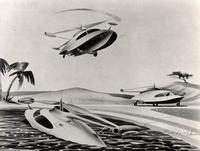| The Leisure Society | 2004-03-17 05:55 4 comments |
 by Flemming Funch by Flemming FunchWhen I was a kid I was very interested in the future. One thing that was pretty obvious, other than flying cars and space stations, would be that by now we'd really not have to work, per se. It was sort of self-evident, even when I was ten. Of course, if we keep being able to do things better and better, more and more efficiently, more and more bang for the buck, more and more automation - then there would be less and less of an actual need for work. It is a simple calculation. The stuff we need could be produced by a smaller and smaller percentage of the population. Which would allow us to spend our time being creative and having a good time. The reason that didn't happen might be in the same category as why a brand new 3GHz PC isn't any faster than a 4.77MHz IBM PC from 20 years ago. In principle it should be a thousand times faster, and it is, technically speaking. But it doesn't do anything more. It takes longer to start up Word on it than to start WordStar on that ancient relic. And there are many more things that can go wrong, and more one needs to learn in order to use it. Maybe the reason is in the same category as why my household budget looks about the same, no matter how much or how little I make. There's not quite enough for what I need, and I tend to pay things late. If somebody came along and gave me $10,000 extra per month, I would at first feel rich, and pay all my bills, and put some aside. But gradually I would come to think I needed a bigger version of everything, and I'd invest in some things I wouldn't otherwise have. And pretty soon I would have used it up, and have more regular expenses, and I'd again be a little behind. While still living essentially the same way. You know, in a house, eating food, driving vehicles, wearing clothes, breathing air. You can probably draw a nice systems diagram of how there are several self-reinforcing loops involved in these scenarios. If there's capacity to make more stuff or do more things, they will be done, and they will create new needs and new ideas about new things that need to be done. The PC of today would indeed run WordStar like lightning, but I'd be missing the graphics, and would quickly look around for other things it ought to do. Voids will be filled. And there's the influence from all the other folks who have some new gadget or feature. If my neighbor has 3D displays on his walls, I'll feel a little left out, even if I was doing great with a monochrome screen at some other point in time. So, what would it take for progress to actually add up to progress, rather than to staying in the same spot with some slightly different gear? I think the main limiting factor is not the envy of my neighbor's stuff, but the economics of production. It doesn't have to be that way, but with the way business is currently structured economically, it is quite natural. Economic rewards flow to those who keep the wheels churning, rather than necessarily to those who solve the biggest problems in the most efficient way. There's no economic incentive to constructing the machinery that would give everybody in the world food to eat every day, without them having to work. Even though it would be fairly easy and comparatively cheap to do. But it wouldn't turn a profit. People who aren't working don't make money to buy stuff, so they aren't good consumers. People who aren't working is a problem in the current scheme of things. Something that requires the financing of unemployement payments, which requires that the wheels are churning faster somewhere else, creating profits that can be diverted for that purpose. It is all pretty insane of course. If you can formulate an economic scheme that clearly measures the actual costs of various approaches, and the value people perceive in them, and which which allows easy financing of the permanent solving of big problems, and gives little value to wasteful and unnecessary work - then it can all change rather quickly. No, I'm not talking about communism. Rather about a free market with a good enough flow of high quality of information, using a different kind of currency. A currency that is built on quality of life, and which doesn't have a built-in accelerating corrosion that encourages fake productivity for its own sake. Rather, a system the encourages the optimization and maximization of free time and creativity. It is not too late. The future is yet to come. |